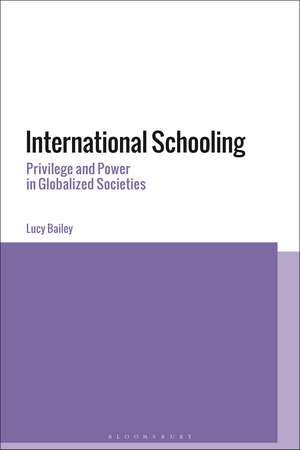International Schooling: Privilege and Power in Globalized Societies
Autor Lucy Baileyen Limba Engleză Paperback – 19 apr 2023
| Toate formatele și edițiile | Preț | Express |
|---|---|---|
| Paperback (1) | 189.99 lei 6-8 săpt. | |
| Bloomsbury Publishing – 19 apr 2023 | 189.99 lei 6-8 săpt. | |
| Hardback (1) | 596.98 lei 6-8 săpt. | |
| Bloomsbury Publishing – 20 oct 2021 | 596.98 lei 6-8 săpt. |
Preț: 189.99 lei
Preț vechi: 248.62 lei
-24% Nou
Puncte Express: 285
Preț estimativ în valută:
36.36€ • 38.88$ • 30.31£
36.36€ • 38.88$ • 30.31£
Carte tipărită la comandă
Livrare economică 18 aprilie-02 mai
Preluare comenzi: 021 569.72.76
Specificații
ISBN-13: 9781350224957
ISBN-10: 1350224952
Pagini: 192
Dimensiuni: 156 x 234 x 25 mm
Greutate: 0.27 kg
Editura: Bloomsbury Publishing
Colecția Bloomsbury Academic
Locul publicării:London, United Kingdom
ISBN-10: 1350224952
Pagini: 192
Dimensiuni: 156 x 234 x 25 mm
Greutate: 0.27 kg
Editura: Bloomsbury Publishing
Colecția Bloomsbury Academic
Locul publicării:London, United Kingdom
Caracteristici
Shows how wider social inequalities around socio-economic difference, ethnicity, 'race' and gender are reproduced and resisted through international schooling
Notă biografică
Lucy Bailey is Associate Professor and Head of Education Studies at Bahrain Teachers College, University of Bahrain, Bahrain. She is the author of Third Culture Teacher (2019) and lead author of Access to Higher Education: Refugees' Stories from Malaysia (2018).
Cuprins
Introduction1. Globalisation, Education and the International Schools Movement2. Conceptualising the International School3. The Micro-Politics of International Schools4. Teaching in International Schools5. Internationalism or Westernisation?6. Educating for Global Citizenship7. Inequalities in the International School8. International Education and International Schools Conclusion: What Future for International Education? References Index
Recenzii
Lucy Bailey invites stakeholders in international schools to critically examine their likely contribution to global inequality and, equipped with this perspective, suggests pathways to support agendas for progressivism and equity in education. This lucid book should be essential reading for all international school stakeholders whether educators, parents, governors, or investors.
The distinction of international schools and their breath-taking growth appears to have outstripped professional safeguards and lived ethics. While the optics of the industry remain pedantically mired in systemised injustices and inequities, Lucy Bailey takes firm aim at a sector in need of a soul, not a mission statement. Bravo!
Integrating her own research with a comprehensive review of recent literature, Lucy Bailey's International Schooling. is a vital resource for enhancing understandings of international schooling. Juxtaposing analytic angles and empirical vignettes, Bailey offers a set of core registers and significant fault lines for studying this heterogenous and dynamic movement.
This book offers a scholarly exploration, from a mainly sociological perspective, of a range of issues arising in the burgeoning field of international schooling. Engaging with issues of privilege, power, diversity and equality, the book will be of value both to those charged with the promotion of international education in schools and to those researching in the field.
The distinction of international schools and their breath-taking growth appears to have outstripped professional safeguards and lived ethics. While the optics of the industry remain pedantically mired in systemised injustices and inequities, Lucy Bailey takes firm aim at a sector in need of a soul, not a mission statement. Bravo!
Integrating her own research with a comprehensive review of recent literature, Lucy Bailey's International Schooling. is a vital resource for enhancing understandings of international schooling. Juxtaposing analytic angles and empirical vignettes, Bailey offers a set of core registers and significant fault lines for studying this heterogenous and dynamic movement.
This book offers a scholarly exploration, from a mainly sociological perspective, of a range of issues arising in the burgeoning field of international schooling. Engaging with issues of privilege, power, diversity and equality, the book will be of value both to those charged with the promotion of international education in schools and to those researching in the field.
